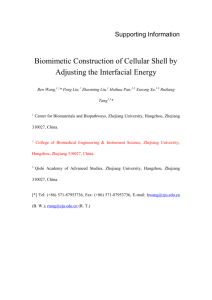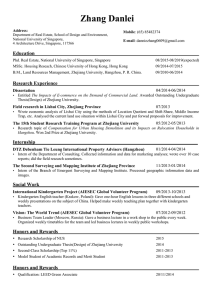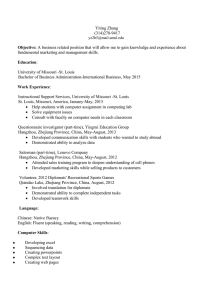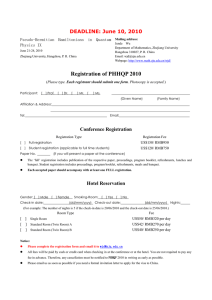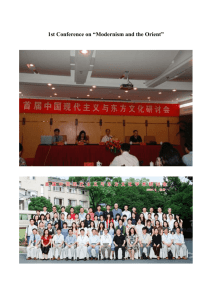2016 International Conference on Energy Finance Call for
advertisement
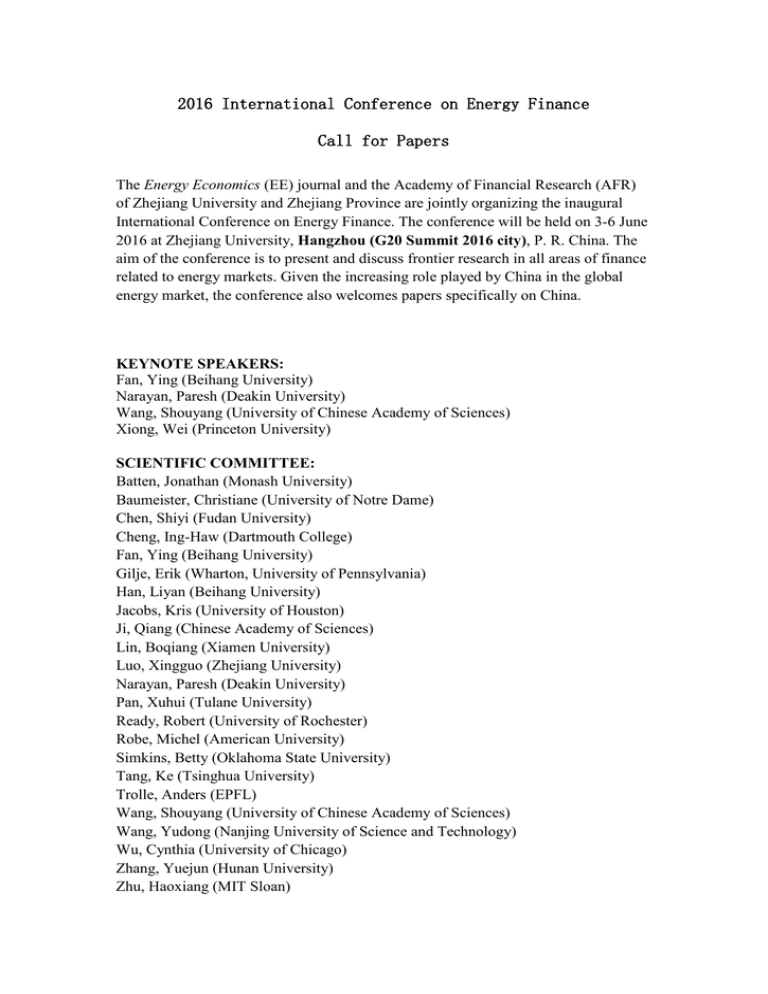
2016 International Conference on Energy Finance Call for Papers The Energy Economics (EE) journal and the Academy of Financial Research (AFR) of Zhejiang University and Zhejiang Province are jointly organizing the inaugural International Conference on Energy Finance. The conference will be held on 3-6 June 2016 at Zhejiang University, Hangzhou (G20 Summit 2016 city), P. R. China. The aim of the conference is to present and discuss frontier research in all areas of finance related to energy markets. Given the increasing role played by China in the global energy market, the conference also welcomes papers specifically on China. KEYNOTE SPEAKERS: Fan, Ying (Beihang University) Narayan, Paresh (Deakin University) Wang, Shouyang (University of Chinese Academy of Sciences) Xiong, Wei (Princeton University) SCIENTIFIC COMMITTEE: Batten, Jonathan (Monash University) Baumeister, Christiane (University of Notre Dame) Chen, Shiyi (Fudan University) Cheng, Ing-Haw (Dartmouth College) Fan, Ying (Beihang University) Gilje, Erik (Wharton, University of Pennsylvania) Han, Liyan (Beihang University) Jacobs, Kris (University of Houston) Ji, Qiang (Chinese Academy of Sciences) Lin, Boqiang (Xiamen University) Luo, Xingguo (Zhejiang University) Narayan, Paresh (Deakin University) Pan, Xuhui (Tulane University) Ready, Robert (University of Rochester) Robe, Michel (American University) Simkins, Betty (Oklahoma State University) Tang, Ke (Tsinghua University) Trolle, Anders (EPFL) Wang, Shouyang (University of Chinese Academy of Sciences) Wang, Yudong (Nanjing University of Science and Technology) Wu, Cynthia (University of Chicago) Zhang, Yuejun (Hunan University) Zhu, Haoxiang (MIT Sloan) ORGANIZING COMMITTEE: Huang, Ying (Zhejiang University) Jin, Xuejun (Zhejiang University) Luo, Xingguo (Zhejiang University), conference co-chairs Narayan, Paresh (Deakin University), conference co-chairs Yang, Liuyong (Zhejiang University), conference chair TOPICS: We welcome submissions from all topics related to energy finance, including but not limited to the following areas: - Pricing, hedging, and risk analysis of energy markets; - Portfolio optimization including energy/commodities derivatives; - Financialization of energy markets; -Micro & macroeconomic analysis of energy; -Corporate finance and risk management related to energy; -Financing, mergers & acquisitions in energy markets/industries; - Managerial accounting & economics for energy related corporations; -Capital structure, privatization and funding of energy companies; -Econometric/statistical analysis of energy markets; - Regulation and taxation of energy industries; - Global and regional trade of energy products; - Forecasting energy demand and improving energy efficiency; and -Trading strategies related to the energy markets. Publication: Selected papers are eligible to be considered for publication in the Energy Economics (EE) in a special issue devoted to the conference. If you wish your paper to be considered for publication in the EE please indicate so in your email. Note that the acceptance of a paper is not a guarantee of publication by the EE. All papers selected for inclusion in the special issue will go through the journal's blind review process. The Special Issue will be guest edited by Alfred Deakin Professor Paresh Narayan (Deakin University) and will be published in the December 2016 or June 2017 issue. Special Sessions: The conference committee welcomes proposals from academics and policy-makers for special sessions, roundtables and panels. Please email to EnergyFinance@zju.edu.cn by February 29, 2016. SUBMISSIONS AND IMPORTANT DATES: February 29, 2016: Deadline for Abstract/Paper Submission (PDF files). March 31, 2016: Notification of acceptance/rejection. April 10, 2016: Early registration deadline. June 20-30: Energy Economic Special Issue submission window will open. Authors are invited to submit their research papers (in English) in PDF file to the following address: EnergyFinance@zju.edu.cn Further information will be provided on the conference website: http://www.afr.zju.edu.cn/ If you have questions, please contact us via email: EnergyFinance@zju.edu.cn or xgluo@zju.edu.cn (Dr. Xingguo Luo) About Hangzhou Hangzhou is the capital and largest city of Zhejiang Province in Eastern China. It has been one of the most renowned and prosperous cities of China for much of the last 1,000 years. It was settled as early as 4,700 years ago, thus giving birth to the auroral Liangzhu Civilization. One of the seven ancient capitals and the key scenic tourism and historical culture cities in China, Hangzhou once was applauded as "the most splendid and luxurious city in the world" by Marco Polo, the Italian traveler in the 13th century. HISTORY AND CULTURE Hangzhou was founded during the Qin Dynasty as Qiantang County. It was chosen as the new capital of the Southern Song Dynasty when they regrouped in 1123. From the early 12th century until the Mongol invasion of 1276 (known as Lin'an), it served as the seat of the imperial government, a centre of trade and entertainment and the nexus of the main branches of the civil service. During that time, the city was a sort of gravitational centre of Chinese civilization. Numerous philosophers, politicians, and men of literature, including some of the most celebrated poets in Chinese history such as Su Shi, Lu You, and Xin Qiji came here to live and die. ECONOMY A core city of the Yangtze River Delta, Hangzhou has a position on the Hangzhou Bay 180 kilometres southwest of Shanghai that gives it economic power. It is now the most economically vigorous city in China and its economic power ranks first among sub-provincial cities. It has been rated by the World Bank as having "the best environment" in China for three years consecutively, and by Forbes Magazine as "the best city for commerce in Mainland China" for five years consecutively. LANDSCAPES Hangzhou is known for its historic relics and natural beauty. It is often perceived as one of the most beautiful cities in China, also ranking as one of the most scenic cities. Although Hangzhou has been through many recent urban developments, it still retains its historical and cultural heritage. One of Hangzhou's most popular sights is the West Lake, a UNESCO World Heritage Site. The West Lake Cultural Landscape covers an area of 33 km2 (3,323 hectares) and includes some of Hangzhou's most notable historic and scenic places. The West Lake, a UNESCO World Heritage Site West Lake Impression Show Tea Picking at Longjing Village About Zhejiang University http://www.zju.edu.cn/english/ Zhejiang University is a prestigious institution of higher education with a long history, was founded in 1897. In recent years, Zhejiang University maintains a leading position in China in output indicators including publications, patents and etc., and has made abundant important achievements in science, technology, humanities and social sciences. Zhejiang University always takes initiative in catering for national and regional needs, and exerts itself to become an influential high-level source of innovation and a pool of talents. In 2014, research fund at Zhejiang University amounted to 3.121 billion Yuan. 115 projects under research have each secured a grant of more than 10 million. As of Dec. 31, 2014, there are a total of more than 46,364 full-time students enrolled at Zhejiang University, including approximately 13,952 graduate students, 8,779 Ph.D candidates, and 23,633 undergraduates. In addition, there are about 5,746 international students currently attending Zhejiang University. Among its approximate 3,437 standing faculty members, 1,474 faculty members have title of professor. Other important facts and figures are as follows: 12 members of the Chinese Academy of Sciences, 17 members of the Chinese Academy of Engineering, 69 experts in State "1000-elite Programs", 41 chief scientists of national 973 projects, 111 Chair Professors in Chang Jiang Scholars Program, and 105 scholars awarded with National Science Fund for Distinguished Young Scholars. With five campuses, namely Zijingang, Yuquan, Xixi, Huajiachi and Zhijiang campus, Zhejiang University encompasses an area of 4,503,741 square meters with school buildings covering 2,308,783 square meters of floor space. The university library holds a collection of more than 6.71million volumes. In addition, Zhejiang University has 7 high-level affiliated hospitals.
